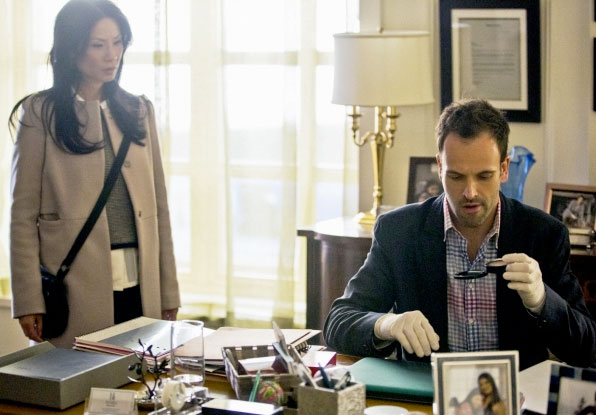Elementary: 111 “Dirty Laundry” Review

Reviewed by Phil Boothman.
Elementary has returned to our screens almost two months after it came back to US television, and it’s currently too soon to tell whether or not it’s been missed. The chemistry between Holmes and Watson was somewhat lacking this week, and the case to be solved started off mundane and escalated rapidly into being ridiculous, but there were still some enjoyable moments.
The case involves a universally well-liked hotel manager named Teri Purcell, found dead in an industrial washing machine in the hotel’s basement. The police, along with Holmes and Watson, visit the family of the deceased where Holmes works out with typical swiftness that there had been some kind of disagreement between Teri and her husband, as he had been sleeping on the couch. Watson, meanwhile, befriends Carly Purcell, their daughter, a promising athlete with a history of prescription medication abuse and tells her to call if she has any problems.
A nosy neighbour points them in the direction of Jeffrey Silver, a philanthropist running a land mine disposal charity and potential lover of Teri Purcell. Naturally, he turns out to have an alibi, but they are soon given another lead in the form of some issues Teri was having with call girls frequenting the hotel bar, and Holmes decides he needs to take Watson ‘whore-fishing’.
This was one of the most enjoyable scenes in the episode, as Holmes displays his proficiency for spotting hookers in a crowded bar as Watson looks on with no small amount of disdain: what he calls ‘anthropological’, she simply calls ‘misogynistic’, although it’s difficult to work out who to side with. Holmes soon spots a call girl and questions her after jokingly suggesting that he and Watson are a couple looking for a someone to service both of them, and it turns out that Teri was allowing call girls in, even assisting them in using the service elevator and turning off the security cameras.
After a root through Teri’s laptop, Holmes discovers a video feed with cameras located in multiple hotel rooms: believing they were used for blackmailing purposes, he sits and watches thousands of hours of footage on fast-forward, until he reaches footage of two French men talking and realises that Teri wasn’t a blackmailer, she was a Russian spy.
The decision to take the plot down this route jarred with me slightly, as it felt like a very old-fashioned, Cold War-era twist in the tale. I don’t know a great deal about international politics, admittedly, but surely the ‘Russians are the bad guys’ stereotype has worn a little thin by now? It could be a reference to several original Conan Doyle stories about Holmes combatting Nazi spies, but it still felt very dated as a conceit, and the route the story took after this quickly spiralled into plain old nonsense.
It turns out that Teri’s ‘husband’ was also a Russian spy, and they were forced to conceive by their devious Russian spymasters in order to obtain Carly as an asset: as an American citizen, she could infiltrate areas of government that her parents never could, which is the reason Teri was forcing Carly into attending a specific college to begin her ascent of the political ladder. It also turns out that, after a disagreement with her mother, Carly pushed her away, making her fall over and crack her head open on her desk, thus making Carly the killer.
Or so it seems: Watson does some extra digging and finds out that Jeffrey, who was actually Teri’s handler, turned up and used a potential prison sentence as leverage over Carly to do what her mother wanted her to do. However, upon dragging Teri’s body to the laundry room to hide it, he discovered that she wasn’t actually dead and finished the job off himself.
This felt a little too much like an easy escape for Carly: prior to her discovery, Watson has a conversation with Holmes about cases not turning out the way they wanted them to, and Holmes states that ‘the only thing a question promises is an answer’, but it doesn’t necessarily promise an answer that everyone is happy with. This would have been an interesting point to run with, showing up a problem with Holmes’ technique: that sometimes seeing the truth means you discover things you might not want to. But, with the final-act twist that it was actually nasty piece of work Jeffrey who killed Teri and not Carly dilutes that concept down so far it is basically meaningless.
A vague subplot runs through the episode concerning Holmes and Watson’s disagreement over general cleanliness, with Watson believing that order brings about structure, which is helpful for a recovering addict, and Holmes believing that greatness springs from chaos, but it is largely unimportant in the grand scheme of things. What is important is Watson’s work with Holmes drawing to a close, with just ten days left: Holmes is convinced that she will stay on in some capacity, even suggesting that she could lie to his father about a potential backslide in order to keep getting paid for doing what she is doing. However, at the episode’s close, she tells him that she has taken on another job, and will in fact be leaving him. For my part, I don’t believe that for a single second, not least due to the fact that there are still 13 episodes left of the season.
Verdict: 4/10
Not exactly a staggering return to form after a long break, “Dirty Laundry” didn’t excite me to the extent that previous episodes have. The plot was contrived and somewhat ridiculous, and the resolution was rather disappointing. However, points must be awarded for continuing to allow the Holmes-Watson relationship develop organically, and the ‘whore-fishing’ scene, so the episode wasn’t a complete loss!



